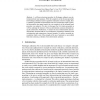Free Online Productivity Tools
i2Speak
i2Symbol
i2OCR
iTex2Img
iWeb2Print
iWeb2Shot
i2Type
iPdf2Split
iPdf2Merge
i2Bopomofo
i2Arabic
i2Style
i2Image
i2PDF
iLatex2Rtf
Sci2ools
127
click to vote
CONCUR
2010
Springer
2010
Springer
On the Use of Non-deterministic Automata for Presburger Arithmetic
Abstract. A well-known decision procedure for Presburger arithmetic uses deterministic finite-state automata. While the complexity of the decision procedure for Presburger arithmetic based on quantifier elimination is known (roughly, there is a double-exponential non-deterministic time lower bound and a triple exponential deterministic time upper bound), the exact complexity of the automata-based procedure was unknown. We show in this paper that it is triple-exponential as well by analysing the structure of the non-deterministic automata obtained during the construction. Furthermore, we analyse the sizes of deterministic and nondeterministic automata built for several subclasses of Presburger arithmetic such as disjunctions and conjunctions of atomic formulas. To retain a canonical representation which is one of the strengths of the use of automata we use residual finite-state automata, a subclass of non-deterministic automata.
CONCUR 2010 | Decision Procedure | Deterministic finite-state Automata | Distributed And Parallel Computing | Presburger Arithmetic |
Related Content
| Added | 24 Jan 2011 |
| Updated | 24 Jan 2011 |
| Type | Journal |
| Year | 2010 |
| Where | CONCUR |
| Authors | Antoine Durand-Gasselin, Peter Habermehl |
Comments (0)

